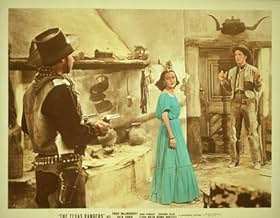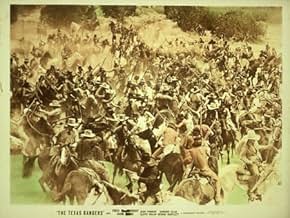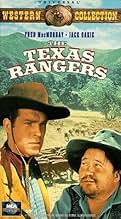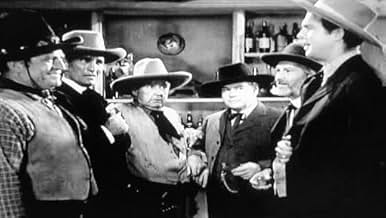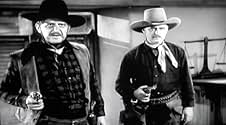IMDb RATING
6.6/10
895
YOUR RATING
Two down-on-their-luck former outlaws volunteer to be Texas Rangers and find themselves assigned to bring in an old friend, now a notorious outlaw.Two down-on-their-luck former outlaws volunteer to be Texas Rangers and find themselves assigned to bring in an old friend, now a notorious outlaw.Two down-on-their-luck former outlaws volunteer to be Texas Rangers and find themselves assigned to bring in an old friend, now a notorious outlaw.
- Nominated for 1 Oscar
- 1 nomination total
Benny Bartlett
- David
- (as Bennie Bartlett)
Fred Kohler
- Jess Higgins
- (as Fred Kohler Sr.)
George 'Gabby' Hayes
- Judge Snow
- (as George Hayes)
Stanley Andrews
- First Higgins Henchman
- (uncredited)
Irving Bacon
- David's Father
- (uncredited)
Kathryn Bates
- School Teacher
- (uncredited)
John Beck
- Stage Passenger
- (uncredited)
Hank Bell
- Hank Wallace, Texas Ranger
- (uncredited)
Virginia Brissac
- David's Mother
- (uncredited)
Featured reviews
"The Texas Rangers" tells the story of three pals (Fred MacMurray, Jack Oakie, Lloyd Nolan) who are living the lives of outlaws until they become separated when cornered by a posse. MacMurray and Oakie wind up joining the Texas Rangers while Nolan becomes the notorious "Polka Dot Bandit". Eventually you know that the two sides will have the inevitable showdown. Great action scenes involving an Indian attack highlight the film.
A very young clean-shaven MacMurray is good in the lead and Jack Oakie is..well Jack Oakie as MacMurray's trusty sidekick. Nolan is fittingly evil as the grinning villain of the piece. Heroine Jean Parker plays MacMurray's love interest who convinces him of the error of his ways.
In the courtroom scene, watch for "B" western favorites George "Gabby" Hayes as a judge, Fred Kohlor as the town boss and Charles (Ming the Merciless) Middleton as his lawyer.
If the story seems familiar, it was remade as "The Streets of Laredo" in 1949 with William Holden, William Bendix and Macdonald Carey in the MacMurray, Oakie and Nolan roles respectively.
A very young clean-shaven MacMurray is good in the lead and Jack Oakie is..well Jack Oakie as MacMurray's trusty sidekick. Nolan is fittingly evil as the grinning villain of the piece. Heroine Jean Parker plays MacMurray's love interest who convinces him of the error of his ways.
In the courtroom scene, watch for "B" western favorites George "Gabby" Hayes as a judge, Fred Kohlor as the town boss and Charles (Ming the Merciless) Middleton as his lawyer.
If the story seems familiar, it was remade as "The Streets of Laredo" in 1949 with William Holden, William Bendix and Macdonald Carey in the MacMurray, Oakie and Nolan roles respectively.
The copy I watched courtesy of YouTube was clean and crisp, and the film itself was good by the standards of the mid-1930s.
Unlike some other reviewers here on IMDb, I've always thought Fred MacMurray an acceptable Western actor, and I found Jack Okie irritating in the first part of the film - especially as he rode along with MacMurray anticipating a romantic encounter with a señorita. The back projection was reasonable enough, certainly compared with that in "The Plainsman", issued in the same year.
With much of the film being set before Texas became a state (which happened in 1845), there were lots of anachronisms - relating to the Rangers' kit and weapons for example. And the telegraph system was very much in its infancy - I wonder if it had reached Texas?
One might also mention the unrealistic death following the shot under the table.
On the plus side, the fight between the Rangers and the Indians was excellent and Lloyd Nolan in his early scenes radiated charisma - before reverting to the sort of nasty character he was to portray in later films.
Unlike some other reviewers here on IMDb, I've always thought Fred MacMurray an acceptable Western actor, and I found Jack Okie irritating in the first part of the film - especially as he rode along with MacMurray anticipating a romantic encounter with a señorita. The back projection was reasonable enough, certainly compared with that in "The Plainsman", issued in the same year.
With much of the film being set before Texas became a state (which happened in 1845), there were lots of anachronisms - relating to the Rangers' kit and weapons for example. And the telegraph system was very much in its infancy - I wonder if it had reached Texas?
One might also mention the unrealistic death following the shot under the table.
On the plus side, the fight between the Rangers and the Indians was excellent and Lloyd Nolan in his early scenes radiated charisma - before reverting to the sort of nasty character he was to portray in later films.
I'm sure in casting The Texas Rangers Paramount had it in mind to broaden Fred MacMurray's appeal by putting him in a western. MacMurray had been a star at Paramount for two years and had appeared in mostly light comic parts as he did throughout his career. I mean Paramount could have cast Gary Cooper or Joel McCrea, both of whom were available at the studio. MacMurray did the film and gave a creditable performance, but as he remarked, "the horse and I were never as one." He never really did feel comfortable in westerns and ones he later appeared in were long after his Paramount studio days were over.
The Texas Rangers film is based on stories derived from Walter Presscott Webb's authoritative history of the legendary law enforcement outfit which was only published a few years back. Fred MacMurray, Jack Oakie and Lloyd Nolan play three outlaws who drift into Texas and become separated. MacMurray and Oakie join the Texas Rangers and Nolan continues his outlaw ways.
Lots of good action here folks. A really great Comanche Indian attack sequence is well staged by Director King Vidor. Lots of familiar western faces support the leads like Fred Kohler and Gabby Hayes. Edward Ellis as the commandant of the Texas Rangers comes off a lot like Lewis Stone and had MGM instead of Paramount had made this film, Lewis Stone definitely would have been cast in Ellis's role.
Despite MacMurray's misgivings about westerns, The Texas Rangers is a pretty good action western with great character development for the three leads.
The Texas Rangers film is based on stories derived from Walter Presscott Webb's authoritative history of the legendary law enforcement outfit which was only published a few years back. Fred MacMurray, Jack Oakie and Lloyd Nolan play three outlaws who drift into Texas and become separated. MacMurray and Oakie join the Texas Rangers and Nolan continues his outlaw ways.
Lots of good action here folks. A really great Comanche Indian attack sequence is well staged by Director King Vidor. Lots of familiar western faces support the leads like Fred Kohler and Gabby Hayes. Edward Ellis as the commandant of the Texas Rangers comes off a lot like Lewis Stone and had MGM instead of Paramount had made this film, Lewis Stone definitely would have been cast in Ellis's role.
Despite MacMurray's misgivings about westerns, The Texas Rangers is a pretty good action western with great character development for the three leads.
This Western from back in 1936. It doesn't have the fancy special effects, nor color, nor big budget, etc. But it will stand up to just about any Western made today. In glorious black and white, it is one to see when you get the opportunity. Fred MacMurray is the star and does one of his best jobs of acting (seemed more relaxed), Jack Oakie (a great character actor with just the right touch of humor), Lloyd Nolan (who played the bad guy so well) and Jean Parker (the pretty girl who tames MacMurray). The story starts out with three friends who rob stage coaches until a posse catches up to them and they have to split up. MacMurray and Oakie become Texas Rangers with the idea of getting inside info for more hold ups. But experience with the Rangers and a smart girl turn the boys toward the side of the law. Problem is that LLoyd Nolan is still on the opposite side of the law and causing problems. Not to give anything away, but you can guess the ultimate showdown arrives. In between is plenty of action and exciting Indian attacks. Don't miss this one if you like Cowboys and Indians.
The Texas Rangers is directed by King Vidor who also co-writes with Elizabeth Hill, Louis Stevens and Walter Prescott Webb. It stars Fred MacMurray, Jack Oakie, Jean Parker and Lloyd Nolan. Music is by Gerard Carbonara and cinematography by Edward Cronjager. Plot has MacMurray and Oakie as two outlaws who decide to become Texas Rangers, something which invariably brings them into conflict with another outlaw pal.
It showcases the good and bad of 1930s Westerns. The action is strong and vibrant, the landscapes appealing and the story as a premise is always interesting. But those good points are countered with weak scripting, goofs, logic holes and a mixed bag of acting performances. But all told, Vidor's movie comes through its problems to stay firmly on the good side of good for the Western fan.
It's good guys versus bad guys on the home front, with the Indians lining up in numbers to be the common foe. It's here for the latter, where Vidor excels, constructing the action scenes with great skill as a ream of extras in Indian attire attack in their droves, arrows and bullets fly with murderous worth, bodies hurl and fall about, it's exciting stuff. The highlight coming as the Indians start flinging boulders off of a cliff face down onto the Rangers down below; the sound work here especially great, as is the stunt work in this whole segment of the film.
MacMurray and Oakie make a likable pair, but both seem a touch out of place in this portion of the Wild West. But Nolan cuts a nice snarly figure as chief villain Sam "Polka Dot" McGee, and he gets to deliver the film's best (nastiest) moment. Parker is pretty but pretty much a token, while secondary support slots are capably filled by the likes of Edward Ellis, Benny Bartlett and Frank Shannon. Cronjager's black and white photography is on the money, neatly utilising the New Mexico locations as wide open vistas that impose on the characters. While Carbonara scores it with standard Cowboys and Indian flavours for the attacks, and bombastic machismo for the Texas Rangers patrols.
Full of formula and mixed signals as to what it wants to be, The Texas Rangers is none the less an enjoyable picture and one of the better Oaters from the 30s. 7/10
Footnote: A sequel followed in 1940 called The Texas Rangers Ride Again. In 1949 The Texas Rangers was remade as Streets of Laredo, with William Holden starring.
It showcases the good and bad of 1930s Westerns. The action is strong and vibrant, the landscapes appealing and the story as a premise is always interesting. But those good points are countered with weak scripting, goofs, logic holes and a mixed bag of acting performances. But all told, Vidor's movie comes through its problems to stay firmly on the good side of good for the Western fan.
It's good guys versus bad guys on the home front, with the Indians lining up in numbers to be the common foe. It's here for the latter, where Vidor excels, constructing the action scenes with great skill as a ream of extras in Indian attire attack in their droves, arrows and bullets fly with murderous worth, bodies hurl and fall about, it's exciting stuff. The highlight coming as the Indians start flinging boulders off of a cliff face down onto the Rangers down below; the sound work here especially great, as is the stunt work in this whole segment of the film.
MacMurray and Oakie make a likable pair, but both seem a touch out of place in this portion of the Wild West. But Nolan cuts a nice snarly figure as chief villain Sam "Polka Dot" McGee, and he gets to deliver the film's best (nastiest) moment. Parker is pretty but pretty much a token, while secondary support slots are capably filled by the likes of Edward Ellis, Benny Bartlett and Frank Shannon. Cronjager's black and white photography is on the money, neatly utilising the New Mexico locations as wide open vistas that impose on the characters. While Carbonara scores it with standard Cowboys and Indian flavours for the attacks, and bombastic machismo for the Texas Rangers patrols.
Full of formula and mixed signals as to what it wants to be, The Texas Rangers is none the less an enjoyable picture and one of the better Oaters from the 30s. 7/10
Footnote: A sequel followed in 1940 called The Texas Rangers Ride Again. In 1949 The Texas Rangers was remade as Streets of Laredo, with William Holden starring.
Did you know
- TriviaKing Vidor made this movie to honor the celebrations of the centennial of the state of Texas.
- GoofsHawkins and the other Rangers are surrounded by Indians. He kills the 2 Indians rolling rocks, throwing his empty pistol at one. As he descends the other side, he mounts a bareback horse, riding off shooting a pistol that shouldn't be there as he rides away.
- Quotes
Wahoo Jones: How do you expect to find Sam down in this country? Texas! Phooey! No towns, no ranch houses, no gals, no nuthin'. Hah! We can't see a jack rabbit in two days. Boy, you can't tell me we're still in the United States!
- ConnectionsEdited into Le Retour des Texas Rangers (1940)
Details
- Runtime
- 1h 38m(98 min)
- Color
- Aspect ratio
- 1.37 : 1
Contribute to this page
Suggest an edit or add missing content

